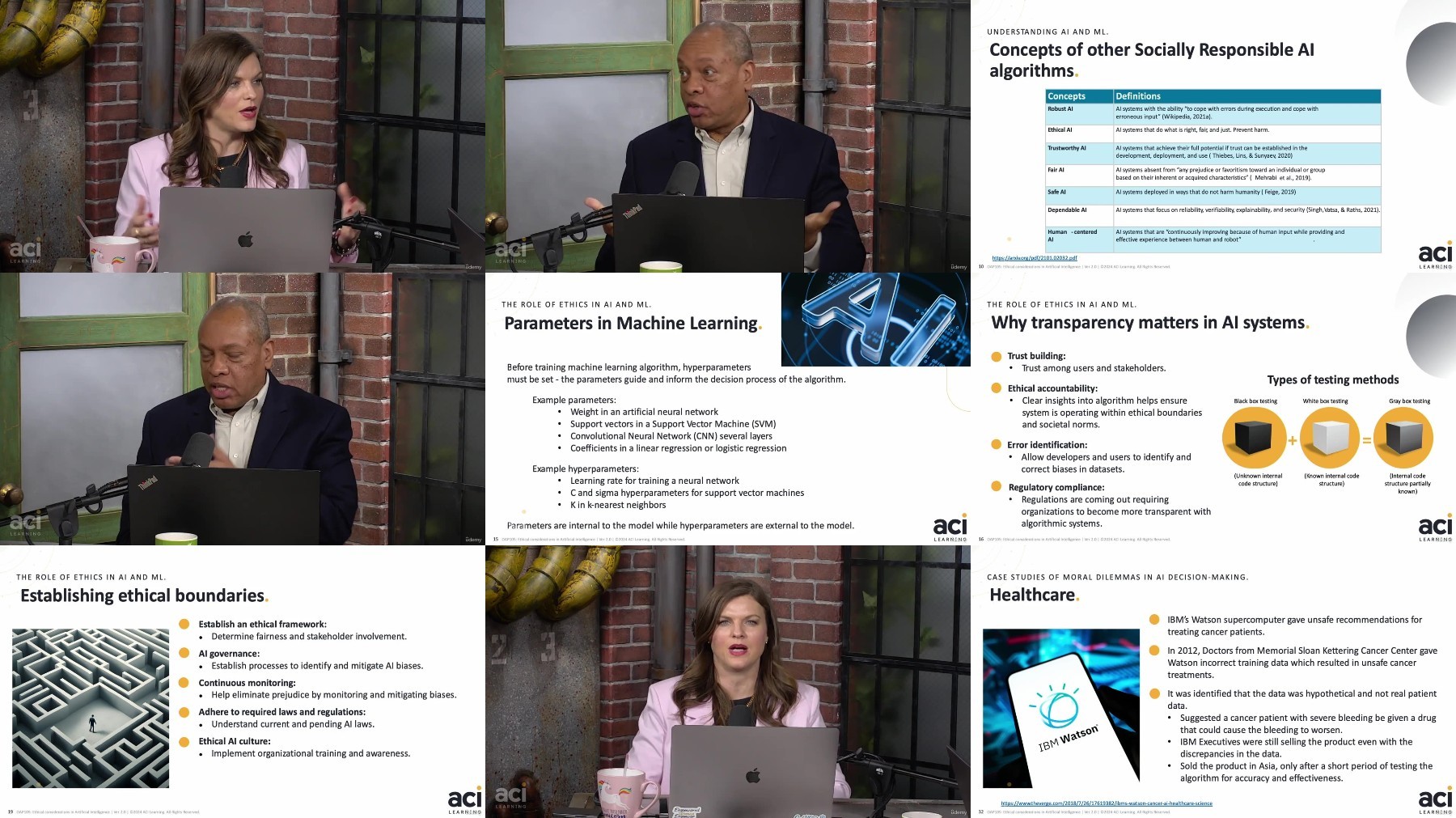Most Commented
Ethical Considerations In Artificial Intelligence




Description material

Ethical Considerations In Artificial Intelligence
Published 10/2024
MP4 | Video: h264, 1920x1080 | Audio: AAC, 44.1 KHz
Language: English | Size: 2.53 GB | Duration: 1h 53m
Navigating Ethical Boundaries in AI
What you'll learn
Identify and articulate the key ethical considerations associated with the development and use of Artificial Intelligence in various organizational contexts.
Assess the effects of AI on society, including issues related to bias, privacy, and accountability, and recognize their implications for organizations.
Explain the critical role internal auditors play in evaluating and promoting ethical practices surrounding AI technologies within their organizations.
Perform risk assessments focused on AI-related ethical challenges, identifying potential areas of concern and suggesting mitigation strategies.
Advocate for best practices that foster transparency and fairness in AI systems, enhancing trust among stakeholders.
Lead discussions on ethical AI usage within organizations, encouraging a culture of integrity and responsibility in AI deployment.
Requirements
Participants are encouraged to have the following foundational knowledge and skills before enrolling in the Ethics in Artificial Intelligence for Auditors course:
Familiarity with auditing concepts, methodologies, and practices is essential for engaging with the course material.
A general understanding of AI technologies, including machine learning and data analytics, will enhance participants' comprehension of ethical implications.
Prior experience in risk assessment or compliance roles will be beneficial for contextualizing the discussions on ethical boundaries.
Familiarity with relevant regulations and guidelines concerning data privacy and ethical use of technology, such as GDPR or CCPA, is advantageous.
A willingness to engage in discussions about ethics and responsibility in technology use will contribute to a productive learning environment.
While these prerequisites are recommended, a strong motivation to learn about the ethical dimensions of AI will also support participants' success in the course.
Description
As Artificial Intelligence (AI) transforms industries and enhances productivity, it also raises critical ethical considerations that users, organizations, and society must address. This course explores the ethical implications of AI, examining its societal effects and the challenges it presents, such as bias, privacy concerns, and accountability.Participants will delve into case studies and real-world scenarios to understand how AI can impact decision-making processes and influence organizational culture. The course emphasizes the vital role of internal auditors in establishing ethical boundaries that guide the development and deployment of AI technologies.Key topics include frameworks for ethical AI use, the auditor's role in assessing AI risks, and best practices for promoting transparency and fairness in AI systems. By the end of the course, participants will be equipped with the knowledge and tools necessary to help their clients navigate the ethical landscape of AI, ensuring responsible implementation that aligns with organizational values and societal expectations. This course is essential for auditors seeking to enhance their expertise in AI ethics and contribute to fostering a culture of integrity within their organizations.Participants are encouraged to have the following foundational knowledge and skills before enrolling in the Ethics in Artificial Intelligence for Auditors course:Basic Understanding of Auditing Principles: Familiarity with auditing concepts, methodologies, and practices is essential for engaging with the course material.Introductory Knowledge of Artificial Intelligence: A general understanding of AI technologies, including machine learning and data analytics, will enhance participants' comprehension of ethical implications.Experience in Risk Management or Compliance: Prior experience in risk assessment or compliance roles will be beneficial for contextualizing the discussions on ethical boundaries.Awareness of Regulatory Standards: Familiarity with relevant regulations and guidelines concerning data privacy and ethical use of technology, such as GDPR or CCPA, is advantageous.Interest in Ethical Considerations: A willingness to engage in discussions about ethics and responsibility in technology use will contribute to a productive learning environment.While these prerequisites are recommended, a strong motivation to learn about the ethical dimensions of AI will also support participants' success in the course.
Overview
Section 1: Ethical Considerations in Artificial Intelligence
Lecture 1 Course Overview
Lecture 2 Part 1
Lecture 3 Part 2
Lecture 4 Part 3
Lecture 5 Full Lecture
This course is ideal for anyone aiming to enhance their understanding of the ethical dimensions of AI and their role in promoting responsible practices within organizations.

FileAxa
Warning! You are not allowed to view this text.
RapidGator
Warning! You are not allowed to view this text.
FileStore
TurboBit
Warning! You are not allowed to view this text.
Join to our telegram Group
Information
Users of Guests are not allowed to comment this publication.
Users of Guests are not allowed to comment this publication.
Choose Site Language
Recommended news
Commented



![eM Client Pro 9.2.1735 Multilingual [Updated]](https://pikky.net/medium/wXgc.png)



![[PORTABLE] Abelssoft File Organizer 2022 4.05.42179 Multilingual](https://i.postimg.cc/JzTRYM90/Abelssoft-File-Organizer.png)


![Movavi Video Editor 24.0.2.0 Multilingual [ Updated]](https://pikky.net/medium/qhrc.png)

